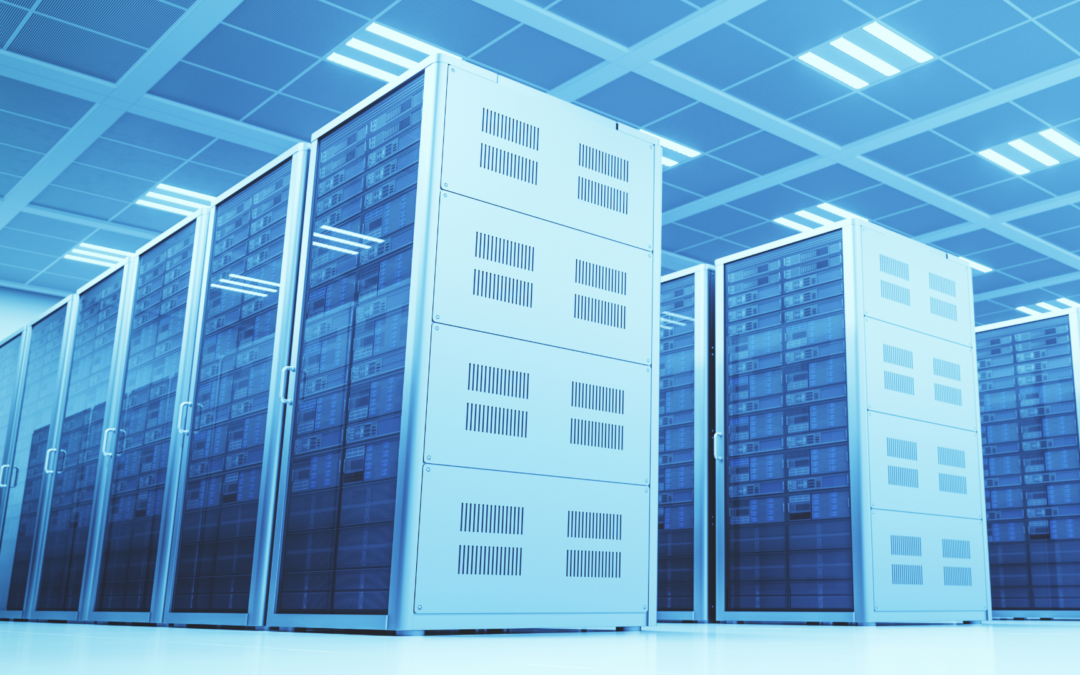Storing digital files has become an everyday necessity. Whether for work, education or personal use, the digital economy plays a major role in our lives. For this reason, the demand for data storage and so-called "colocation" in data centers is at an all-time high. This increased need for secure & professional off-site storage is the catalyst for the modern data center.
Traditionally, company data was stored on internal servers and network devices. However, with the advent of 'cloud storage', many companies have been attracted to external solutions. Companies no longer want to deal with the overhead and maintenance that comes with clunky servers and data storage infrastructure. But the data has to live somewhere.
Why are more and more large and small companies relying on colocation services and what should you consider when choosing a colocation provider? This article gives you an overview of the most important questions relating to colocation and server housing.
What is colocation or server housing?
The word colocation is made up of the Latin terms "co" (together, with) and "lokus" (place). A colocation data center is used by several customers to operate and maintain their own servers or network devices in a suitable, secure environment. The hardware therefore belongs to the customer's own company, but is located in an external data center of a colocation provider. This is also referred to as server housing.
You can house servers and devices together by renting the appropriate space from the provider. Often in the form of a cabinet or a so-called rack.
Advantages of colocation for your company
Colocation benefits companies of all sizes. Small companies can maintain the functions of a large IT department without major investment. Medium to larger companies can expand their data storage capacity without the need for costly construction or facility rentals. Colocation allows companies to store equipment in a secure facility with high bandwidth, power and public IP addresses provided by the third-party provider.
Colocation is also always recommended if the server or servers meet very individual requirements. In other words, when highly sensitive data is involved or highly specialized programs are operated. The company's own compliance guidelines or current hardware contracts can also play a role in the decision.
Below we list the most important advantages of colocation:
Reliability
Colocation facilities provide cooling systems, power and communication systems that ensure constant connectivity. Companies can invest in equipment and measures to implement similar systems in-house, but this can require a significant investment of money, manpower and space. Data centers offer greater protection against power outages due to the numerous safeguards in place.
High performance
Electronic devices are "temperamental". It works best in a temperature-controlled, dust-free environment. Even the cleanest offices can't compete with the cooling and air filtration systems that professional data centers provide. Colocation offers redundant cooling systems, meaning components are thermally managed to ensure air flows through and an acceptable temperature is maintained, even if one unit fails. Most data centers have not just two cooling systems per fire compartment, but at least three.
Physical security
Data centers are designed to protect your systems from theft and other risks that could compromise the security of your information. They offer a higher level of physical protection and enforce strict measures to secure data, such as video surveillance, private suites (cages), fire detection and suppression systems and personnel traps or segregation systems (a small room with two interlocking doors).
Maintenance by third parties
In many cases, companies only start thinking about server support equipment when a problem arises. Data centers design, monitor and maintain support systems and have dedicated systems and staff to ensure that servers are running at optimum performance. Regular tests for diesel generators of the emergency power systems, fire protection technology and air conditioning technology are part of the continuous maintenance plan there. An emergency scenario is usually run through at least once a month.
Speed
Colocation facilities offer cost-effective connections to the Internet and provide top performance with very high bandwidths. There is also no risk of connection interruption or overload thanks to multiple redundant connections to various carrier companies.
Specialist staff
Colocation providers have the right IT staff to monitor and maintain servers. These experts are hired to build and implement state-of-the-art infrastructures with high-performance equipment.
Scalability
Colocation gives your business the flexibility to easily scale up or down, while only paying for the space and bandwidth you need.
Risk management
Data breaches or even natural disasters happen, but when your critical devices are operated in an off-site data center, security and redundancies are in place to continue operations in such cases.
Colocation specifically offers the opportunity to achieve greater compliance quickly and easily:
Physical IT security is an essential component of IT requirements such as KRITIS, GDPR or BSI standards. It is not without reason that it is usually an integral part of awareness training for employees.
As far as the physical IT security of end devices is concerned, there are a number of protective measures that can be taken to prevent the loss or theft of data. But when cyber criminals target servers, it becomes much more complex. This is where professional support is often required. For this reason, more and more companies are turning to the colocation model to ensure maximum expertise & security from colocation providers - and thus achieve greater compliance at the same time.
This advantage results from the synergy of certifications obtained such as ISO 27001, ISAE 3402, EN 50600, TIA-942 Tier 3 and Tier 4 from external providers and the listed IT requirements.
Better connectivity
Data centers have fully redundant network connections to ensure that your business-critical applications always run without interruption.
Redundant power supply
Data centers offer power redundancy. With a combination of multiple power grids, generators, battery backup systems and excellent maintenance practices, colocation centers ensure that they have power even when you don't.
Flexibility
Customers gain the flexibility to adapt to higher bandwidth levels to meet their traffic needs without having to make multiple investments. With colocation, data peaks are distributed over time to numerous users, keeping bandwidth costs low.
Growth
Colocation enables the expansion of data storage to meet a company's requirements. Companies can expand their networks without having to buy more equipment or building space. As your business grows, your IT infrastructure can be adapted to your requirements quickly and with less investment.
Springboard to the cloud
If your company is also interested in a cloud computing solution, colocation offers an opportunity for a smooth transition. Moving your equipment to an off-site facility with increased capacity and performance helps support business needs and ensures a smooth system transfer.
The most important factors when choosing a suitable colocation provider
When choosing a colocation provider, it is important to think about your individual requirements before starting your search. Be sure to include the following considerations in your decision-making process:
Location
One of the most common reasons for hosting workloads in a colocation facility instead of a public cloud is that colocation providers typically offer data centers in locations where cloud providers do not. This is important if, for example, you need to place workloads in a specific region to minimize latency.
However, some providers offer more data center locations than others. Some also offer data centers closer to population centers or other priority regions than others.
Depending on where your workloads are ideally hosted, the number and type of data center locations can be a major factor in selecting a colocation provider.
Managed services (Managed Services)
Some colocation providers offer so-called managed services. The specific types of services can vary widely, from hardware provision and management to data backup, managed security services and beyond.
If you need help managing your infrastructure, consider services like these. On the other hand, if you have the resources to manage everything yourself and only need data center real estate, managed services won't play a role in choosing the best colocation provider for you.
Networking
While virtually all colocation facilities offer powerful network connectivity solutions, their interconnect options can vary in variety and performance. If you need specific types of network solutions - for example, if you need to connect your colocated infrastructure to a specific public cloud - compare interconnect offerings from different providers. Networking with your company and other locations should also be considered.
Load capacity
Most colocation companies offer power backups, redundant networks and other resources that can increase the resilience of workloads running in a colocation facility. But again, some "colos" offer more than others.
Some may offer disaster recovery services to help customers restore disrupted environments, for example. Some may also offer guarantees that their data centers can withstand certain types of disasters, such as floods and hurricanes.
If you need highly available workloads - and who doesn't these days? - Compare the reliability guarantees of colocation providers.
Scalability and flexibility
What services does the colocation provider offer? Can the offering meet the scaling requirements as the company grows? What about the migration requirements? As the company grows, so does the amount of data. The colocation facility should be able to meet any additional capacity requirements.
Security services
What kind of security procedures and protocols are implemented by the colocation provider to protect company data? Some colocation centers offer 24/7 network monitoring and provide proactive security alerts and DDoS mitigation services.
Track record
One final factor to consider when choosing a colocation is the history - and future prospects - of the colocation provider. How long has it been around? Does it have a history of uninterrupted service? Is it likely to be acquired by a larger provider?
While newer providers are by no means inherently inferior, those that have made records of providing reliable data center facilities will likely continue to do so. You probably wouldn't choose a public cloud that went live yesterday, and similarly, you should think about choosing colocation.
Timetable
Think ahead. Colocation success often requires long-term alignment between provider and customer business. Discuss future plans, see where the colocation provider is headed, let them know where the business will go, and make sure all contracts allow for changes over time. For example, if the customer needs more services during the contract period, but the provider has no plans to add such services, that provider may not be right for the business.




